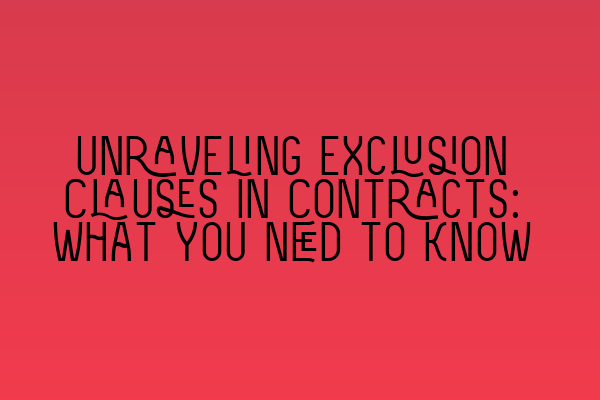Unraveling Exclusion Clauses in Contracts: What You Need to Know
When entering into a contract, it’s essential to understand all the terms and conditions outlined, including any exclusion clauses. Exclusion clauses are provisions in a contract that limit or exclude liability for certain types of loss or damages. These clauses can have significant implications for both parties involved, so it’s crucial to have a clear understanding of their scope and enforceability. In this article, we will unravel the complexities of exclusion clauses and discuss everything you need to know.
Understanding Exclusion Clauses
Exclusion clauses are often found in contracts to protect one party from specific risks or liabilities. These clauses aim to limit or exclude the liability of one party in the event of a breach of contract, negligence, or any other form of legal claim.
There are different types of exclusion clauses, including:
1. Limitation Clauses: These clauses aim to limit the amount of liability that one party can be held responsible for in case of a breach or loss.
2. Exemption Clauses: These clauses completely exempt one party from any liability or responsibility for a particular type of loss or damages.
3. Indemnity Clauses: Indemnity clauses require one party to compensate the other for any loss or damages incurred, regardless of fault or negligence.
The Validity of Exclusion Clauses
While exclusion clauses serve a valid purpose in contract law, they are subject to certain legal requirements to ensure fairness and protect the interests of both parties.
1. Reasonable Notice: For an exclusion clause to be enforceable, it must be brought to the attention of the other party at the time the contract is formed. This can be done through clear and conspicuous wording, highlighting the presence and significance of the clause.
2. Reasonableness Test: Even if an exclusion clause is properly communicated, it may still be deemed unfair and unenforceable if it fails the reasonableness test. The reasonableness of a clause is assessed based on factors such as the bargaining power of the parties, the nature of the contract, and the extent of the exclusion.
3. Unfair Contract Terms Act 1977: In the United Kingdom, the Unfair Contract Terms Act 1977 sets out additional regulations concerning exclusion clauses. This legislation aims to protect consumers from unfair contract terms and gives the court discretionary power to declare certain exclusion clauses as void.
Implications and Considerations
As a party to the contract, it’s crucial to carefully review and consider the implications of any exclusion clauses. Here are a few important points to keep in mind:
1. Seek Legal Advice: If you are uncertain about the scope or enforceability of an exclusion clause, seek legal advice. An experienced solicitor can help you understand your rights, obligations, and potential risks.
2. Negotiate the Terms: In many cases, parties have the opportunity to negotiate the terms of a contract, including exclusion clauses. It’s worth considering whether certain clauses can be revised or removed to better align with your interests.
3. Document Everything: When dealing with exclusion clauses, it is essential to maintain proper documentation. Keep records of all contractual negotiations, amendments, and communications to ensure a clear and comprehensive understanding of the agreed terms.
4. Consider Insurance Coverage: If an exclusion clause limits or excludes liability for certain risks, it may be prudent to consider obtaining appropriate insurance coverage to mitigate potential losses or damages.
Conclusion
Exclusion clauses are an integral part of contract law, offering parties protection and flexibility. However, their enforceability and fairness are subject to legal scrutiny. Understanding the types of exclusion clauses, their validity requirements, and the associated implications are essential for both businesses and individuals entering into contractual agreements. If you have any concerns or queries about exclusion clauses in your contracts, consult with a qualified solicitor to ensure you are fully informed and protected.
Related Articles:
– SQE 1 Practice Exam Questions
– SQE 1 Practice Mocks FLK1 FLK2
– SQE 2 Preparation Courses
– SQE 1 Preparation Courses
– SRA SQE Exam Dates
